|
The National Science Council of the Executive Yuan conferred the Outstanding Research Award upon the winners in different categories in March, 2009. Ten professors from NTU won this honored award, topping the nation's academic institutions once again in the number of winners!
NTU's winners of the 2008 National Science Council's Outstanding Research Award are as follows (in the order of the colleges): Professor Feng-Wu Chou of the Department of Chinese Literature, Professor Chun-Hsien Chen of the Department of Chemistry, Associate Professor Sheng-Hsien Chiu of the Department of Chemistry, Associate Professor Yih-Min Wu of the Department of Geosciences, Professor Shu-Chun Teng of the Department of Microbiology, Professor Fu-Chun Wu of the Department of Environmental Systems Engineering, Professor Shey-Shi Lu of the Institute of Electronics Engineering, Professor Homer Chen of the Institute of Communication Engineering, Professor Chung-Wu Chen of the Department of Law, and Professor Tzu-Ming Pan of the Institute of Microbiology and Biochemistry.
Biographical Profile of the Winners:
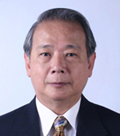 Dr. Feng-wu Chou, professor of Chinese Literature at Taiwan University, was a visiting professor in East Asian Languages and Civilizations at the University of Chicago (2004), and chair of the Department of Chinese Language and Literature at Chung Cheng University (1989-91) and Chi Nan University (1995-97). For over twenty years, he devoted himself to the study of Chinese paleography and newly excavated texts, with publications on such diverse topics as the bone and shell inscriptions of the Shang Dynasty, the bronze inscriptions of the Zhou Dynasty, the covenant texts of the Spring and Autumn Period, the silk and bamboo manuscripts of the Warring States Period, Qin, and Han Dynasty , and Dun-huang manuscripts. His main achievements include 1) the theory of "domestication" for understanding the origins and spread of bamboo texts excavated from the ancient state of Chu; 2) the decipherment of many keywords in excavated texts; 3) the re-examination of the Confucian tradition during the Warring States, using excavated texts; 4) the creation of a new discipline about the calligraphy of excavated texts; 5) the promotion of research and scholarly interchange, including the following: International Conference on Newly Excavated Texts and Ancient Civilization (2002); Seminar on Newly Excavated Texts from Chu of the Warring States (2004-08); Annual Workshop for the Study of Paleography and Excavated Texts (2005-06); "Rebirth of the Classics: Conference on the Methodology for the Study of Excavated Texts" (2005, 2008); the International Forum on Bamboo and Silk Documents (2006-08), etc. Dr. Feng-wu Chou, professor of Chinese Literature at Taiwan University, was a visiting professor in East Asian Languages and Civilizations at the University of Chicago (2004), and chair of the Department of Chinese Language and Literature at Chung Cheng University (1989-91) and Chi Nan University (1995-97). For over twenty years, he devoted himself to the study of Chinese paleography and newly excavated texts, with publications on such diverse topics as the bone and shell inscriptions of the Shang Dynasty, the bronze inscriptions of the Zhou Dynasty, the covenant texts of the Spring and Autumn Period, the silk and bamboo manuscripts of the Warring States Period, Qin, and Han Dynasty , and Dun-huang manuscripts. His main achievements include 1) the theory of "domestication" for understanding the origins and spread of bamboo texts excavated from the ancient state of Chu; 2) the decipherment of many keywords in excavated texts; 3) the re-examination of the Confucian tradition during the Warring States, using excavated texts; 4) the creation of a new discipline about the calligraphy of excavated texts; 5) the promotion of research and scholarly interchange, including the following: International Conference on Newly Excavated Texts and Ancient Civilization (2002); Seminar on Newly Excavated Texts from Chu of the Warring States (2004-08); Annual Workshop for the Study of Paleography and Excavated Texts (2005-06); "Rebirth of the Classics: Conference on the Methodology for the Study of Excavated Texts" (2005, 2008); the International Forum on Bamboo and Silk Documents (2006-08), etc.
 Dr. Chun-hsien Chen, who joined Department of Chemistry (National Taiwan University) in the Fall of 2006, is currently the Coordinator of Chemistry Division of National Science Council. He is the recipient of Distinguished Teaching Award (National Tsing Hua University), Distinguished Alumnus (National Sun Yat-Sen University), and Young Scientist Medal (The Chinese Chemical Society). His long-term research interests focus on (1) monolayer self-assembly and nanoparticle sensing, (2) single molecular conductivity, and (3) resolving oligomers and soft matters at molecular level. Recent research advancement includes the development of a simple method that allows the alignment of polyaromatics with one-single domain for ~7 mm. Dr. Chun-hsien Chen, who joined Department of Chemistry (National Taiwan University) in the Fall of 2006, is currently the Coordinator of Chemistry Division of National Science Council. He is the recipient of Distinguished Teaching Award (National Tsing Hua University), Distinguished Alumnus (National Sun Yat-Sen University), and Young Scientist Medal (The Chinese Chemical Society). His long-term research interests focus on (1) monolayer self-assembly and nanoparticle sensing, (2) single molecular conductivity, and (3) resolving oligomers and soft matters at molecular level. Recent research advancement includes the development of a simple method that allows the alignment of polyaromatics with one-single domain for ~7 mm.
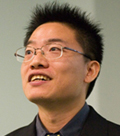 Dr. Sheng-Hsien Chiu, associate professor of the Department of Chemistry, has received several honors and awards in the past few years, including the Thieme Synthesis/Synlett Journal Award (2008), the Young Scholar Research Publication Award of Academia Sinica (2007) and the Wu Da-You Research Award of National Science Council (2007). His research interest is to develop new molecular recognition systems and use them to construct functional molecules such as molecular switches and molecular machines. Professor Chiu expects that the operation of the molecular machines on the solid surface will be a proper channel for converting the chemical, photo or electro energy into mechanical forces in the nano-world. The lessons of non-covalent interactions learned from the construction of the recognition systems will also be very important in the future design and development of artificial enzymes and proteins. His representative works in the past few years are (1) synthesizing the smallest rotaxane prepared to date under solvent-free condition (Highlighted in Nature Magazine, Nature, 2008, 455, 267) and (2) developing a new protocol for rotaxane synthesis called "threading-followed-by-swelling" (Highlighted in Science Magazine, Science, 2007, 315, 1639). Dr. Sheng-Hsien Chiu, associate professor of the Department of Chemistry, has received several honors and awards in the past few years, including the Thieme Synthesis/Synlett Journal Award (2008), the Young Scholar Research Publication Award of Academia Sinica (2007) and the Wu Da-You Research Award of National Science Council (2007). His research interest is to develop new molecular recognition systems and use them to construct functional molecules such as molecular switches and molecular machines. Professor Chiu expects that the operation of the molecular machines on the solid surface will be a proper channel for converting the chemical, photo or electro energy into mechanical forces in the nano-world. The lessons of non-covalent interactions learned from the construction of the recognition systems will also be very important in the future design and development of artificial enzymes and proteins. His representative works in the past few years are (1) synthesizing the smallest rotaxane prepared to date under solvent-free condition (Highlighted in Nature Magazine, Nature, 2008, 455, 267) and (2) developing a new protocol for rotaxane synthesis called "threading-followed-by-swelling" (Highlighted in Science Magazine, Science, 2007, 315, 1639).
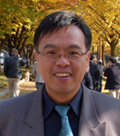 One of Dr. Wu's major efforts has been the establishment of an earthquake early warning system in Taiwan to enable speedy response to damaging earthquakes. Following a large earthquake in Taiwan, utilizing a quick magnitude determination based on the first 10 sec of signals from a virtual and sub-network of seismic stations configured automatically, this system reduces the earthquake reporting time to 20 sec. It could offer more than 10 sec warning time for cities 100 km away from the earthquake source. A lead time of several seconds will allow pre-programmed emergency response to take place prior to the arrival of strong ground shaking. Recently, Dr. Wu explored a practical approach to earthquake early warning in southern California, Taiwan, and Japan by determining a ground-motion period parameter and a high-pass filtered displacement amplitude parameter Pd from the initial 3 sec of the P waveforms. Earthquake information could be estimated using and Pd methods within 10 sec of the occurrence of a large earthquake and gives warning for cities 30 km away from the epicenter. Currently, Dr. Wu's method of earthquake warning is being tested in Taiwan, Southern California, Beijing, Pacific Tsunami Warning Center and Italy. For the research on observational seismology, Dr. Wu and his research team analyzed seismic wave velocity structures, focal mechanisms, and seismicity of the Taiwan region. It gives a new insight of the seismo-tectonics of the Taiwan region. Dr. Wu and his research team also found that the 1999 Chi-Chi Mw7.6 and 2003 Chengkung Mw6.8 earthquakes were preceded by a notable decrease of the regional seismicity rate. Mogi-donut-like variations in seismicity had been identified around these two earthquakes rupture region. Those results will be helpful to understand large earthquake genesis mechanism and benefit to the earthquake forecasting. One of Dr. Wu's major efforts has been the establishment of an earthquake early warning system in Taiwan to enable speedy response to damaging earthquakes. Following a large earthquake in Taiwan, utilizing a quick magnitude determination based on the first 10 sec of signals from a virtual and sub-network of seismic stations configured automatically, this system reduces the earthquake reporting time to 20 sec. It could offer more than 10 sec warning time for cities 100 km away from the earthquake source. A lead time of several seconds will allow pre-programmed emergency response to take place prior to the arrival of strong ground shaking. Recently, Dr. Wu explored a practical approach to earthquake early warning in southern California, Taiwan, and Japan by determining a ground-motion period parameter and a high-pass filtered displacement amplitude parameter Pd from the initial 3 sec of the P waveforms. Earthquake information could be estimated using and Pd methods within 10 sec of the occurrence of a large earthquake and gives warning for cities 30 km away from the epicenter. Currently, Dr. Wu's method of earthquake warning is being tested in Taiwan, Southern California, Beijing, Pacific Tsunami Warning Center and Italy. For the research on observational seismology, Dr. Wu and his research team analyzed seismic wave velocity structures, focal mechanisms, and seismicity of the Taiwan region. It gives a new insight of the seismo-tectonics of the Taiwan region. Dr. Wu and his research team also found that the 1999 Chi-Chi Mw7.6 and 2003 Chengkung Mw6.8 earthquakes were preceded by a notable decrease of the regional seismicity rate. Mogi-donut-like variations in seismicity had been identified around these two earthquakes rupture region. Those results will be helpful to understand large earthquake genesis mechanism and benefit to the earthquake forecasting.
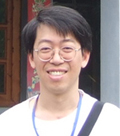 Cells use the telomere binding protein Cdc13 to recruit telomerase at the late S phase to elongate telomeres. Dr. Teng found that Cdc13 is regulated by cell cycle checkpoint kinases Mec1/Tel1. Mec1/Tel1 activates Cdc13 for its role in telomerase recruitment. In addition, Dr. Teng and his research team members identified ~20 factors in four different pathways required for telomere recombination. Dr. Teng was able to define the rate limiting step in the detail mechanism of telomere recombination. Lastly , in the process of searching for drug targets for ALT-type cancers, Dr. Teng found that TOP3 is required for ALT pathway. He identified peptide and chemical inhibitors which could block the telomere recombination pathway in cancer cells. Cells use the telomere binding protein Cdc13 to recruit telomerase at the late S phase to elongate telomeres. Dr. Teng found that Cdc13 is regulated by cell cycle checkpoint kinases Mec1/Tel1. Mec1/Tel1 activates Cdc13 for its role in telomerase recruitment. In addition, Dr. Teng and his research team members identified ~20 factors in four different pathways required for telomere recombination. Dr. Teng was able to define the rate limiting step in the detail mechanism of telomere recombination. Lastly , in the process of searching for drug targets for ALT-type cancers, Dr. Teng found that TOP3 is required for ALT pathway. He identified peptide and chemical inhibitors which could block the telomere recombination pathway in cancer cells.
 Prof. Fu-Chun Wu(Dept. of Bioenvironmental Systems Engineering) was the recipient of NSC Young Scholar Career Award, NTU Research Award and Teaching Award, and is currently a NTU Distinguished Professor. Prof. Wu has long been devoted to the studies of ecohydraulics in gravel-bed rivers; a series of his frequently cited researches include impact analysis of fine sediment intrusion into salmonid spawning gravels, prediction of salmonid embryo survival, analysis of spawning habitat uncertainty and assessment of embryo survival risk, investigation of flushing mechanism for habitat restoration, and optimal flushing strategies. An experimental work on vegetative resistance has been cited over 60 times and was listed by the American Geophysical Union as a classical paper in vegetation hydraulics. Prof. Wu has also performed a mathematical perturbation analysis on forced bars and proposed a new criterion on incipient channel bifurcation for predicting geomorphic evolution of riverine habitat. Recently Prof. Wu expanded his research to the field of ecohydrology, aiming to restore the natural flow regime downstream of a dam/weir via environmental flow releases, such that multiple objectives of ecosystem needs, environmental maintenance, and water supplies can be met. Currently Prof. Wu undertakes a NSC three-year integrative research project on the comprehensive design of multi-function environmental flows for Hsin-dian River in Taipei urban area downstream of Fei-tsui reservoir. Prof. Fu-Chun Wu(Dept. of Bioenvironmental Systems Engineering) was the recipient of NSC Young Scholar Career Award, NTU Research Award and Teaching Award, and is currently a NTU Distinguished Professor. Prof. Wu has long been devoted to the studies of ecohydraulics in gravel-bed rivers; a series of his frequently cited researches include impact analysis of fine sediment intrusion into salmonid spawning gravels, prediction of salmonid embryo survival, analysis of spawning habitat uncertainty and assessment of embryo survival risk, investigation of flushing mechanism for habitat restoration, and optimal flushing strategies. An experimental work on vegetative resistance has been cited over 60 times and was listed by the American Geophysical Union as a classical paper in vegetation hydraulics. Prof. Wu has also performed a mathematical perturbation analysis on forced bars and proposed a new criterion on incipient channel bifurcation for predicting geomorphic evolution of riverine habitat. Recently Prof. Wu expanded his research to the field of ecohydrology, aiming to restore the natural flow regime downstream of a dam/weir via environmental flow releases, such that multiple objectives of ecosystem needs, environmental maintenance, and water supplies can be met. Currently Prof. Wu undertakes a NSC three-year integrative research project on the comprehensive design of multi-function environmental flows for Hsin-dian River in Taipei urban area downstream of Fei-tsui reservoir.
 Prof. Homer Chen is a world-class expert in multimedia processing and communications. He made pivotal contributions to the MPEG-4 and JPEG-2000 international standards for video/image coding, which greatly impacted the advance of digital telecommunications in the world. He held various R&D management and engineering positions with U.S. companies over a period of 17 years, including AT&T Bell Labs, Rockwell Science Center, iVast, and Digital Island (acquired by Cable & Wireless). Since August 2003, he has been with the College of Electrical Engineering and Computer Science, National Taiwan University, where he currently holds the Distinguished Professor rank. Prof. Chen is an IEEE Fellow. He has received numerous awards in recognition of his research contributions, including the Award for Academic Excellence from the National Science Council, the Outstanding Research Award from the Sun Yat-Sen Cultural Foundation, the Best Paper Award from IEEE Transactions on Circuits and Systems for Video Technology, the Pattern Recognition Society Award, the Irving T. Ho Chair Professorship and the SiS Technology Chair Professorship of NTU, and the Distinguished Professor Award from the Chinese Institute of Electrical Engineering. Prof. Chen has abundant industry and academic experiences and is a master at building highly creative teams. His work covers a broad range of topics related to multimedia signal processing, multimedia communications, and applications to digital camera, digital camcorder, digital home, multimedia indexing and retrieval, P2P IPTV, and social network services. Prof. Homer Chen is a world-class expert in multimedia processing and communications. He made pivotal contributions to the MPEG-4 and JPEG-2000 international standards for video/image coding, which greatly impacted the advance of digital telecommunications in the world. He held various R&D management and engineering positions with U.S. companies over a period of 17 years, including AT&T Bell Labs, Rockwell Science Center, iVast, and Digital Island (acquired by Cable & Wireless). Since August 2003, he has been with the College of Electrical Engineering and Computer Science, National Taiwan University, where he currently holds the Distinguished Professor rank. Prof. Chen is an IEEE Fellow. He has received numerous awards in recognition of his research contributions, including the Award for Academic Excellence from the National Science Council, the Outstanding Research Award from the Sun Yat-Sen Cultural Foundation, the Best Paper Award from IEEE Transactions on Circuits and Systems for Video Technology, the Pattern Recognition Society Award, the Irving T. Ho Chair Professorship and the SiS Technology Chair Professorship of NTU, and the Distinguished Professor Award from the Chinese Institute of Electrical Engineering. Prof. Chen has abundant industry and academic experiences and is a master at building highly creative teams. His work covers a broad range of topics related to multimedia signal processing, multimedia communications, and applications to digital camera, digital camcorder, digital home, multimedia indexing and retrieval, P2P IPTV, and social network services.
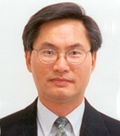 Professor Shey-Shi Lu of the Institute of Electronics Engineering has received many awards, including:The Outstanding Engineering Professor Award from the Chinese Institute of Electrical Engineering, the Si-Nien Fu Award from NTU, and the Golden Silicon Award from Micronix International, etc. In recent years his research capitalizes on the low- cost, high- quality and mass production characteristics of semi-conductor technologies, and, by integrating the interdisciplinary knowledge from electrical engineering, applied mechanics, material science and medicine, he succeeded in inventing a wireless bio-medical System on Chips. Professor Shey-Shi Lu of the Institute of Electronics Engineering has received many awards, including:The Outstanding Engineering Professor Award from the Chinese Institute of Electrical Engineering, the Si-Nien Fu Award from NTU, and the Golden Silicon Award from Micronix International, etc. In recent years his research capitalizes on the low- cost, high- quality and mass production characteristics of semi-conductor technologies, and, by integrating the interdisciplinary knowledge from electrical engineering, applied mechanics, material science and medicine, he succeeded in inventing a wireless bio-medical System on Chips.
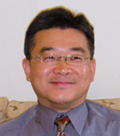 Professor Chung-Wu Chen, Ph. D. of University of ParisⅠin France (1997), is a faculty member of Law Department. Professor Chen was a practicing attorney-at-law, and has been granted NTU Research Contribution Award in Humanities and Social Sciences (2004), and Dissertation Award of University of ParisⅠ(1997). Professor Chen dedicates himself to researches of the two main fields of civil law: Contract and Civil Liability. In an attempt to question the hypothesis that "equality of socio-economic status exits between private parties", through investigating the needs for social change and development in Taiwan, Professor Chen re-examines development of relevant legal systems, jurisprudence and judicial practice to discover new perspectives on some key issues of civil law. Professor Chen wishes to establish an optimal legal model leading to "accident compensation system" that corresponds to social reality and satisfies people's needs, that is, he proposes for a set of universal and common legal principles to provide accident victims with sufficient and reasonable damage compensation that will not be prohibitively undertaken by liable parties. This legal model is anticipated to mitigate State's costs of dispute resolution, and prompt reasonable and efficient utilization of judicial resources. Upon analyzing and systematizing plenty of judicial cases related to various accidents, including medical or traffic ones, Professor Chen attempts to explore the "phenomena" shown under long-term application of Taiwanese civil law to find out the "real issues" behind it. He further seeks the causes attributable to formation of theses issues in terms of social, political, economic and cultural aspects, and finally proposes an adequate solution for above-mentioned causes. Professor Chung-Wu Chen, Ph. D. of University of ParisⅠin France (1997), is a faculty member of Law Department. Professor Chen was a practicing attorney-at-law, and has been granted NTU Research Contribution Award in Humanities and Social Sciences (2004), and Dissertation Award of University of ParisⅠ(1997). Professor Chen dedicates himself to researches of the two main fields of civil law: Contract and Civil Liability. In an attempt to question the hypothesis that "equality of socio-economic status exits between private parties", through investigating the needs for social change and development in Taiwan, Professor Chen re-examines development of relevant legal systems, jurisprudence and judicial practice to discover new perspectives on some key issues of civil law. Professor Chen wishes to establish an optimal legal model leading to "accident compensation system" that corresponds to social reality and satisfies people's needs, that is, he proposes for a set of universal and common legal principles to provide accident victims with sufficient and reasonable damage compensation that will not be prohibitively undertaken by liable parties. This legal model is anticipated to mitigate State's costs of dispute resolution, and prompt reasonable and efficient utilization of judicial resources. Upon analyzing and systematizing plenty of judicial cases related to various accidents, including medical or traffic ones, Professor Chen attempts to explore the "phenomena" shown under long-term application of Taiwanese civil law to find out the "real issues" behind it. He further seeks the causes attributable to formation of theses issues in terms of social, political, economic and cultural aspects, and finally proposes an adequate solution for above-mentioned causes.
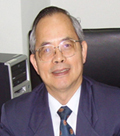 Professor Tzu-Ming Pan, Director of Institute of Microbiology and Biochemistry, National Taiwan University, was awarded 2009 Excellent Research Award by National Science Council, 2009 National Innovation Award in the Academic Research Category by Institute for Biotechnology and Medicine Industry, 2008 Professional Achievement Award from Chinese American Food Society, 2007 Special Contribution Award in the Health Food Development by Taiwan Health Food Society. Professor Pan has published 224 scientific peer reviewed articles in various international journals and conducted 343 conference presentations. Two pioneer research articles on the proteomics study on Monascus published in Journal of Agricultural and Food Chemistry have been the most cited articles during the period of 2007. His work on production and health properties of Monascus has received attention worldwide. In the field of red mold rice (fermented rice of Monascus) research, he not only incubated excellent strains but also completed innovative researches for improving healthy life (include lowering cholesterol, anti-fatigue, anti-obesity and anti-Alzheimer's disease). Having studied Monascus for many years, Professor Pan changed the role of the ancient Chinese food( red mold rice) as ordinary food and natural colorant to that of health food. The excellent research results have been transferred to the biotechnological company. The products for preventing Alzheimer's disease and lowing the cholesterol have become available in the market. Professor Tzu-Ming Pan, Director of Institute of Microbiology and Biochemistry, National Taiwan University, was awarded 2009 Excellent Research Award by National Science Council, 2009 National Innovation Award in the Academic Research Category by Institute for Biotechnology and Medicine Industry, 2008 Professional Achievement Award from Chinese American Food Society, 2007 Special Contribution Award in the Health Food Development by Taiwan Health Food Society. Professor Pan has published 224 scientific peer reviewed articles in various international journals and conducted 343 conference presentations. Two pioneer research articles on the proteomics study on Monascus published in Journal of Agricultural and Food Chemistry have been the most cited articles during the period of 2007. His work on production and health properties of Monascus has received attention worldwide. In the field of red mold rice (fermented rice of Monascus) research, he not only incubated excellent strains but also completed innovative researches for improving healthy life (include lowering cholesterol, anti-fatigue, anti-obesity and anti-Alzheimer's disease). Having studied Monascus for many years, Professor Pan changed the role of the ancient Chinese food( red mold rice) as ordinary food and natural colorant to that of health food. The excellent research results have been transferred to the biotechnological company. The products for preventing Alzheimer's disease and lowing the cholesterol have become available in the market.
|


 Dr. Feng-wu Chou, professor of Chinese Literature at Taiwan University, was a visiting professor in East Asian Languages and Civilizations at the University of Chicago (2004), and chair of the Department of Chinese Language and Literature at Chung Cheng University (1989-91) and Chi Nan University (1995-97). For over twenty years, he devoted himself to the study of Chinese paleography and newly excavated texts, with publications on such diverse topics as the bone and shell inscriptions of the Shang Dynasty, the bronze inscriptions of the Zhou Dynasty, the covenant texts of the Spring and Autumn Period, the silk and bamboo manuscripts of the Warring States Period, Qin, and Han Dynasty , and Dun-huang manuscripts. His main achievements include 1) the theory of "domestication" for understanding the origins and spread of bamboo texts excavated from the ancient state of Chu; 2) the decipherment of many keywords in excavated texts; 3) the re-examination of the Confucian tradition during the Warring States, using excavated texts; 4) the creation of a new discipline about the calligraphy of excavated texts; 5) the promotion of research and scholarly interchange, including the following: International Conference on Newly Excavated Texts and Ancient Civilization (2002); Seminar on Newly Excavated Texts from Chu of the Warring States (2004-08); Annual Workshop for the Study of Paleography and Excavated Texts (2005-06); "Rebirth of the Classics: Conference on the Methodology for the Study of Excavated Texts" (2005, 2008); the International Forum on Bamboo and Silk Documents (2006-08), etc.
Dr. Feng-wu Chou, professor of Chinese Literature at Taiwan University, was a visiting professor in East Asian Languages and Civilizations at the University of Chicago (2004), and chair of the Department of Chinese Language and Literature at Chung Cheng University (1989-91) and Chi Nan University (1995-97). For over twenty years, he devoted himself to the study of Chinese paleography and newly excavated texts, with publications on such diverse topics as the bone and shell inscriptions of the Shang Dynasty, the bronze inscriptions of the Zhou Dynasty, the covenant texts of the Spring and Autumn Period, the silk and bamboo manuscripts of the Warring States Period, Qin, and Han Dynasty , and Dun-huang manuscripts. His main achievements include 1) the theory of "domestication" for understanding the origins and spread of bamboo texts excavated from the ancient state of Chu; 2) the decipherment of many keywords in excavated texts; 3) the re-examination of the Confucian tradition during the Warring States, using excavated texts; 4) the creation of a new discipline about the calligraphy of excavated texts; 5) the promotion of research and scholarly interchange, including the following: International Conference on Newly Excavated Texts and Ancient Civilization (2002); Seminar on Newly Excavated Texts from Chu of the Warring States (2004-08); Annual Workshop for the Study of Paleography and Excavated Texts (2005-06); "Rebirth of the Classics: Conference on the Methodology for the Study of Excavated Texts" (2005, 2008); the International Forum on Bamboo and Silk Documents (2006-08), etc. Dr. Chun-hsien Chen, who joined Department of Chemistry (National Taiwan University) in the Fall of 2006, is currently the Coordinator of Chemistry Division of National Science Council. He is the recipient of Distinguished Teaching Award (National Tsing Hua University), Distinguished Alumnus (National Sun Yat-Sen University), and Young Scientist Medal (The Chinese Chemical Society). His long-term research interests focus on (1) monolayer self-assembly and nanoparticle sensing, (2) single molecular conductivity, and (3) resolving oligomers and soft matters at molecular level. Recent research advancement includes the development of a simple method that allows the alignment of polyaromatics with one-single domain for ~7 mm.
Dr. Chun-hsien Chen, who joined Department of Chemistry (National Taiwan University) in the Fall of 2006, is currently the Coordinator of Chemistry Division of National Science Council. He is the recipient of Distinguished Teaching Award (National Tsing Hua University), Distinguished Alumnus (National Sun Yat-Sen University), and Young Scientist Medal (The Chinese Chemical Society). His long-term research interests focus on (1) monolayer self-assembly and nanoparticle sensing, (2) single molecular conductivity, and (3) resolving oligomers and soft matters at molecular level. Recent research advancement includes the development of a simple method that allows the alignment of polyaromatics with one-single domain for ~7 mm.  Dr. Sheng-Hsien Chiu, associate professor of the Department of Chemistry, has received several honors and awards in the past few years, including the Thieme Synthesis/Synlett Journal Award (2008), the Young Scholar Research Publication Award of Academia Sinica (2007) and the Wu Da-You Research Award of National Science Council (2007). His research interest is to develop new molecular recognition systems and use them to construct functional molecules such as molecular switches and molecular machines. Professor Chiu expects that the operation of the molecular machines on the solid surface will be a proper channel for converting the chemical, photo or electro energy into mechanical forces in the nano-world. The lessons of non-covalent interactions learned from the construction of the recognition systems will also be very important in the future design and development of artificial enzymes and proteins. His representative works in the past few years are (1) synthesizing the smallest rotaxane prepared to date under solvent-free condition (Highlighted in Nature Magazine, Nature, 2008, 455, 267) and (2) developing a new protocol for rotaxane synthesis called "threading-followed-by-swelling" (Highlighted in Science Magazine, Science, 2007, 315, 1639).
Dr. Sheng-Hsien Chiu, associate professor of the Department of Chemistry, has received several honors and awards in the past few years, including the Thieme Synthesis/Synlett Journal Award (2008), the Young Scholar Research Publication Award of Academia Sinica (2007) and the Wu Da-You Research Award of National Science Council (2007). His research interest is to develop new molecular recognition systems and use them to construct functional molecules such as molecular switches and molecular machines. Professor Chiu expects that the operation of the molecular machines on the solid surface will be a proper channel for converting the chemical, photo or electro energy into mechanical forces in the nano-world. The lessons of non-covalent interactions learned from the construction of the recognition systems will also be very important in the future design and development of artificial enzymes and proteins. His representative works in the past few years are (1) synthesizing the smallest rotaxane prepared to date under solvent-free condition (Highlighted in Nature Magazine, Nature, 2008, 455, 267) and (2) developing a new protocol for rotaxane synthesis called "threading-followed-by-swelling" (Highlighted in Science Magazine, Science, 2007, 315, 1639). One of Dr. Wu's major efforts has been the establishment of an earthquake early warning system in Taiwan to enable speedy response to damaging earthquakes. Following a large earthquake in Taiwan, utilizing a quick magnitude determination based on the first 10 sec of signals from a virtual and sub-network of seismic stations configured automatically, this system reduces the earthquake reporting time to 20 sec. It could offer more than 10 sec warning time for cities 100 km away from the earthquake source. A lead time of several seconds will allow pre-programmed emergency response to take place prior to the arrival of strong ground shaking. Recently, Dr. Wu explored a practical approach to earthquake early warning in southern California, Taiwan, and Japan by determining a ground-motion period parameter and a high-pass filtered displacement amplitude parameter Pd from the initial 3 sec of the P waveforms. Earthquake information could be estimated using and Pd methods within 10 sec of the occurrence of a large earthquake and gives warning for cities 30 km away from the epicenter. Currently, Dr. Wu's method of earthquake warning is being tested in Taiwan, Southern California, Beijing, Pacific Tsunami Warning Center and Italy. For the research on observational seismology, Dr. Wu and his research team analyzed seismic wave velocity structures, focal mechanisms, and seismicity of the Taiwan region. It gives a new insight of the seismo-tectonics of the Taiwan region. Dr. Wu and his research team also found that the 1999 Chi-Chi Mw7.6 and 2003 Chengkung Mw6.8 earthquakes were preceded by a notable decrease of the regional seismicity rate. Mogi-donut-like variations in seismicity had been identified around these two earthquakes rupture region. Those results will be helpful to understand large earthquake genesis mechanism and benefit to the earthquake forecasting.
One of Dr. Wu's major efforts has been the establishment of an earthquake early warning system in Taiwan to enable speedy response to damaging earthquakes. Following a large earthquake in Taiwan, utilizing a quick magnitude determination based on the first 10 sec of signals from a virtual and sub-network of seismic stations configured automatically, this system reduces the earthquake reporting time to 20 sec. It could offer more than 10 sec warning time for cities 100 km away from the earthquake source. A lead time of several seconds will allow pre-programmed emergency response to take place prior to the arrival of strong ground shaking. Recently, Dr. Wu explored a practical approach to earthquake early warning in southern California, Taiwan, and Japan by determining a ground-motion period parameter and a high-pass filtered displacement amplitude parameter Pd from the initial 3 sec of the P waveforms. Earthquake information could be estimated using and Pd methods within 10 sec of the occurrence of a large earthquake and gives warning for cities 30 km away from the epicenter. Currently, Dr. Wu's method of earthquake warning is being tested in Taiwan, Southern California, Beijing, Pacific Tsunami Warning Center and Italy. For the research on observational seismology, Dr. Wu and his research team analyzed seismic wave velocity structures, focal mechanisms, and seismicity of the Taiwan region. It gives a new insight of the seismo-tectonics of the Taiwan region. Dr. Wu and his research team also found that the 1999 Chi-Chi Mw7.6 and 2003 Chengkung Mw6.8 earthquakes were preceded by a notable decrease of the regional seismicity rate. Mogi-donut-like variations in seismicity had been identified around these two earthquakes rupture region. Those results will be helpful to understand large earthquake genesis mechanism and benefit to the earthquake forecasting. Cells use the telomere binding protein Cdc13 to recruit telomerase at the late S phase to elongate telomeres. Dr. Teng found that Cdc13 is regulated by cell cycle checkpoint kinases Mec1/Tel1. Mec1/Tel1 activates Cdc13 for its role in telomerase recruitment. In addition, Dr. Teng and his research team members identified ~20 factors in four different pathways required for telomere recombination. Dr. Teng was able to define the rate limiting step in the detail mechanism of telomere recombination. Lastly , in the process of searching for drug targets for ALT-type cancers, Dr. Teng found that TOP3 is required for ALT pathway. He identified peptide and chemical inhibitors which could block the telomere recombination pathway in cancer cells.
Cells use the telomere binding protein Cdc13 to recruit telomerase at the late S phase to elongate telomeres. Dr. Teng found that Cdc13 is regulated by cell cycle checkpoint kinases Mec1/Tel1. Mec1/Tel1 activates Cdc13 for its role in telomerase recruitment. In addition, Dr. Teng and his research team members identified ~20 factors in four different pathways required for telomere recombination. Dr. Teng was able to define the rate limiting step in the detail mechanism of telomere recombination. Lastly , in the process of searching for drug targets for ALT-type cancers, Dr. Teng found that TOP3 is required for ALT pathway. He identified peptide and chemical inhibitors which could block the telomere recombination pathway in cancer cells. Prof. Fu-Chun Wu(Dept. of Bioenvironmental Systems Engineering) was the recipient of NSC Young Scholar Career Award, NTU Research Award and Teaching Award, and is currently a NTU Distinguished Professor. Prof. Wu has long been devoted to the studies of ecohydraulics in gravel-bed rivers; a series of his frequently cited researches include impact analysis of fine sediment intrusion into salmonid spawning gravels, prediction of salmonid embryo survival, analysis of spawning habitat uncertainty and assessment of embryo survival risk, investigation of flushing mechanism for habitat restoration, and optimal flushing strategies. An experimental work on vegetative resistance has been cited over 60 times and was listed by the American Geophysical Union as a classical paper in vegetation hydraulics. Prof. Wu has also performed a mathematical perturbation analysis on forced bars and proposed a new criterion on incipient channel bifurcation for predicting geomorphic evolution of riverine habitat. Recently Prof. Wu expanded his research to the field of ecohydrology, aiming to restore the natural flow regime downstream of a dam/weir via environmental flow releases, such that multiple objectives of ecosystem needs, environmental maintenance, and water supplies can be met. Currently Prof. Wu undertakes a NSC three-year integrative research project on the comprehensive design of multi-function environmental flows for Hsin-dian River in Taipei urban area downstream of Fei-tsui reservoir.
Prof. Fu-Chun Wu(Dept. of Bioenvironmental Systems Engineering) was the recipient of NSC Young Scholar Career Award, NTU Research Award and Teaching Award, and is currently a NTU Distinguished Professor. Prof. Wu has long been devoted to the studies of ecohydraulics in gravel-bed rivers; a series of his frequently cited researches include impact analysis of fine sediment intrusion into salmonid spawning gravels, prediction of salmonid embryo survival, analysis of spawning habitat uncertainty and assessment of embryo survival risk, investigation of flushing mechanism for habitat restoration, and optimal flushing strategies. An experimental work on vegetative resistance has been cited over 60 times and was listed by the American Geophysical Union as a classical paper in vegetation hydraulics. Prof. Wu has also performed a mathematical perturbation analysis on forced bars and proposed a new criterion on incipient channel bifurcation for predicting geomorphic evolution of riverine habitat. Recently Prof. Wu expanded his research to the field of ecohydrology, aiming to restore the natural flow regime downstream of a dam/weir via environmental flow releases, such that multiple objectives of ecosystem needs, environmental maintenance, and water supplies can be met. Currently Prof. Wu undertakes a NSC three-year integrative research project on the comprehensive design of multi-function environmental flows for Hsin-dian River in Taipei urban area downstream of Fei-tsui reservoir. Prof. Homer Chen is a world-class expert in multimedia processing and communications. He made pivotal contributions to the MPEG-4 and JPEG-2000 international standards for video/image coding, which greatly impacted the advance of digital telecommunications in the world. He held various R&D management and engineering positions with U.S. companies over a period of 17 years, including AT&T Bell Labs, Rockwell Science Center, iVast, and Digital Island (acquired by Cable & Wireless). Since August 2003, he has been with the College of Electrical Engineering and Computer Science, National Taiwan University, where he currently holds the Distinguished Professor rank. Prof. Chen is an IEEE Fellow. He has received numerous awards in recognition of his research contributions, including the Award for Academic Excellence from the National Science Council, the Outstanding Research Award from the Sun Yat-Sen Cultural Foundation, the Best Paper Award from IEEE Transactions on Circuits and Systems for Video Technology, the Pattern Recognition Society Award, the Irving T. Ho Chair Professorship and the SiS Technology Chair Professorship of NTU, and the Distinguished Professor Award from the Chinese Institute of Electrical Engineering. Prof. Chen has abundant industry and academic experiences and is a master at building highly creative teams. His work covers a broad range of topics related to multimedia signal processing, multimedia communications, and applications to digital camera, digital camcorder, digital home, multimedia indexing and retrieval, P2P IPTV, and social network services.
Prof. Homer Chen is a world-class expert in multimedia processing and communications. He made pivotal contributions to the MPEG-4 and JPEG-2000 international standards for video/image coding, which greatly impacted the advance of digital telecommunications in the world. He held various R&D management and engineering positions with U.S. companies over a period of 17 years, including AT&T Bell Labs, Rockwell Science Center, iVast, and Digital Island (acquired by Cable & Wireless). Since August 2003, he has been with the College of Electrical Engineering and Computer Science, National Taiwan University, where he currently holds the Distinguished Professor rank. Prof. Chen is an IEEE Fellow. He has received numerous awards in recognition of his research contributions, including the Award for Academic Excellence from the National Science Council, the Outstanding Research Award from the Sun Yat-Sen Cultural Foundation, the Best Paper Award from IEEE Transactions on Circuits and Systems for Video Technology, the Pattern Recognition Society Award, the Irving T. Ho Chair Professorship and the SiS Technology Chair Professorship of NTU, and the Distinguished Professor Award from the Chinese Institute of Electrical Engineering. Prof. Chen has abundant industry and academic experiences and is a master at building highly creative teams. His work covers a broad range of topics related to multimedia signal processing, multimedia communications, and applications to digital camera, digital camcorder, digital home, multimedia indexing and retrieval, P2P IPTV, and social network services. Professor Shey-Shi Lu of the Institute of Electronics Engineering has received many awards, including:The Outstanding Engineering Professor Award from the Chinese Institute of Electrical Engineering, the Si-Nien Fu Award from NTU, and the Golden Silicon Award from Micronix International, etc. In recent years his research capitalizes on the low- cost, high- quality and mass production characteristics of semi-conductor technologies, and, by integrating the interdisciplinary knowledge from electrical engineering, applied mechanics, material science and medicine, he succeeded in inventing a wireless bio-medical System on Chips.
Professor Shey-Shi Lu of the Institute of Electronics Engineering has received many awards, including:The Outstanding Engineering Professor Award from the Chinese Institute of Electrical Engineering, the Si-Nien Fu Award from NTU, and the Golden Silicon Award from Micronix International, etc. In recent years his research capitalizes on the low- cost, high- quality and mass production characteristics of semi-conductor technologies, and, by integrating the interdisciplinary knowledge from electrical engineering, applied mechanics, material science and medicine, he succeeded in inventing a wireless bio-medical System on Chips. Professor Chung-Wu Chen, Ph. D. of University of ParisⅠin France (1997), is a faculty member of Law Department. Professor Chen was a practicing attorney-at-law, and has been granted NTU Research Contribution Award in Humanities and Social Sciences (2004), and Dissertation Award of University of ParisⅠ(1997). Professor Chen dedicates himself to researches of the two main fields of civil law: Contract and Civil Liability. In an attempt to question the hypothesis that "equality of socio-economic status exits between private parties", through investigating the needs for social change and development in Taiwan, Professor Chen re-examines development of relevant legal systems, jurisprudence and judicial practice to discover new perspectives on some key issues of civil law. Professor Chen wishes to establish an optimal legal model leading to "accident compensation system" that corresponds to social reality and satisfies people's needs, that is, he proposes for a set of universal and common legal principles to provide accident victims with sufficient and reasonable damage compensation that will not be prohibitively undertaken by liable parties. This legal model is anticipated to mitigate State's costs of dispute resolution, and prompt reasonable and efficient utilization of judicial resources. Upon analyzing and systematizing plenty of judicial cases related to various accidents, including medical or traffic ones, Professor Chen attempts to explore the "phenomena" shown under long-term application of Taiwanese civil law to find out the "real issues" behind it. He further seeks the causes attributable to formation of theses issues in terms of social, political, economic and cultural aspects, and finally proposes an adequate solution for above-mentioned causes.
Professor Chung-Wu Chen, Ph. D. of University of ParisⅠin France (1997), is a faculty member of Law Department. Professor Chen was a practicing attorney-at-law, and has been granted NTU Research Contribution Award in Humanities and Social Sciences (2004), and Dissertation Award of University of ParisⅠ(1997). Professor Chen dedicates himself to researches of the two main fields of civil law: Contract and Civil Liability. In an attempt to question the hypothesis that "equality of socio-economic status exits between private parties", through investigating the needs for social change and development in Taiwan, Professor Chen re-examines development of relevant legal systems, jurisprudence and judicial practice to discover new perspectives on some key issues of civil law. Professor Chen wishes to establish an optimal legal model leading to "accident compensation system" that corresponds to social reality and satisfies people's needs, that is, he proposes for a set of universal and common legal principles to provide accident victims with sufficient and reasonable damage compensation that will not be prohibitively undertaken by liable parties. This legal model is anticipated to mitigate State's costs of dispute resolution, and prompt reasonable and efficient utilization of judicial resources. Upon analyzing and systematizing plenty of judicial cases related to various accidents, including medical or traffic ones, Professor Chen attempts to explore the "phenomena" shown under long-term application of Taiwanese civil law to find out the "real issues" behind it. He further seeks the causes attributable to formation of theses issues in terms of social, political, economic and cultural aspects, and finally proposes an adequate solution for above-mentioned causes. Professor Tzu-Ming Pan, Director of Institute of Microbiology and Biochemistry, National Taiwan University, was awarded 2009 Excellent Research Award by National Science Council, 2009 National Innovation Award in the Academic Research Category by Institute for Biotechnology and Medicine Industry, 2008 Professional Achievement Award from Chinese American Food Society, 2007 Special Contribution Award in the Health Food Development by Taiwan Health Food Society. Professor Pan has published 224 scientific peer reviewed articles in various international journals and conducted 343 conference presentations. Two pioneer research articles on the proteomics study on Monascus published in Journal of Agricultural and Food Chemistry have been the most cited articles during the period of 2007. His work on production and health properties of Monascus has received attention worldwide. In the field of red mold rice (fermented rice of Monascus) research, he not only incubated excellent strains but also completed innovative researches for improving healthy life (include lowering cholesterol, anti-fatigue, anti-obesity and anti-Alzheimer's disease). Having studied Monascus for many years, Professor Pan changed the role of the ancient Chinese food( red mold rice) as ordinary food and natural colorant to that of health food. The excellent research results have been transferred to the biotechnological company. The products for preventing Alzheimer's disease and lowing the cholesterol have become available in the market.
Professor Tzu-Ming Pan, Director of Institute of Microbiology and Biochemistry, National Taiwan University, was awarded 2009 Excellent Research Award by National Science Council, 2009 National Innovation Award in the Academic Research Category by Institute for Biotechnology and Medicine Industry, 2008 Professional Achievement Award from Chinese American Food Society, 2007 Special Contribution Award in the Health Food Development by Taiwan Health Food Society. Professor Pan has published 224 scientific peer reviewed articles in various international journals and conducted 343 conference presentations. Two pioneer research articles on the proteomics study on Monascus published in Journal of Agricultural and Food Chemistry have been the most cited articles during the period of 2007. His work on production and health properties of Monascus has received attention worldwide. In the field of red mold rice (fermented rice of Monascus) research, he not only incubated excellent strains but also completed innovative researches for improving healthy life (include lowering cholesterol, anti-fatigue, anti-obesity and anti-Alzheimer's disease). Having studied Monascus for many years, Professor Pan changed the role of the ancient Chinese food( red mold rice) as ordinary food and natural colorant to that of health food. The excellent research results have been transferred to the biotechnological company. The products for preventing Alzheimer's disease and lowing the cholesterol have become available in the market.